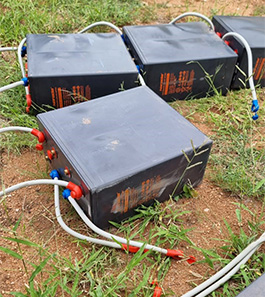A lithium-ion or Li-ion battery is a type of rechargeable battery that uses the reversible intercalation of Li⁺ ions into electronically conducting solids to store energy. In comparison with other commercial rechargeable batteries, Li-ion batteries are characterized by higher specific energy, higher energy density, higher energy efficiency, a longer cycle life, and a longer calendar life. Also noteworthy is a dramatic improvement in lithium-ion battery properties after their market introduction in 1991; over the following 30 years, their volumetric energy density increased threefold while their cost dropped tenfold. In late 2024 global demand passed 1 terawatt-hour per year, while production capacity was more than twice that. South Africa is one of the few countries in the world to have Lithium natural resources.
Not only are lithium ion more energy-dense than lead-acid batteries (meaning they can store more electricity), but they’re also more efficient, have longer lifespans, and offer a better depth of discharge. In terms of DoD, lithium-ion batteries are head and shoulders above lead-acid batteries: whereas lead-acid batteries generally shouldn’t discharge more than 50% of their total capacity, lithium-ion batteries can generally be drawn down to at least 85%.
Let’s say you’re deciding between two batteries. One is lead-acid with 50% DoD, and the other is lithium-ion with 100% depth of discharge. Both are capable of storing 5 kWh (although lithium-ion batteries are usually capable of holding much more electricity than lead-acid batteries). You would only be able to use 2.5 kWh of the lead-acid battery before needing to recharge it, whereas you can pull double the electricity with the lithium-ion battery, expanding the resiliency of your system and reducing your dependency on utility companies.
Our opening image was of a large installation of lead acid batteries in Shimulwini bush camp in the KNP, that was March 2017. We checked on the installation and batteries in late 2022 and advised that they will need to be replaced in the next 6 months. Well, nothing happened until February 2025, when we had quite a few calls from various powers that be that there is an emergency at the camp and they would like to replace the batteries overnight. It is an off-grid system. Well, one cannot just produce these large new Lithium Ion batteries overnight, yet we managed to get them ordered, up there and installed in just two weeks. 8 years of hard work for those batteries! From the image below, one can clearly see that they were quite a fire hazard!!

Don't delay on the purchase of your new batteries or upgrading of your batteries. The price won't be worth the insurance premiums and the payout you won't receive.
Current Automation Mbombela has tested and worked with many batteries over the years, we only support what works and what our suppliers support.
